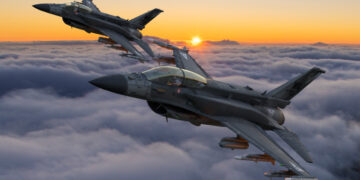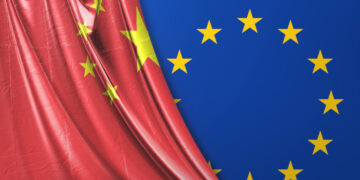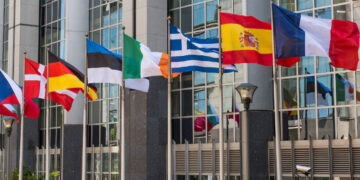Spain’s nationwide blackout in April gave a preview of a darker future, where the vulnerabilities of the digital public sphere convert every disaster into a socio-political war, writes Kavyanjali Kaushik.
When Spain experienced a sweeping power blackout on 28 April, the physical world descended into either chaos or eerie quiet. But something else switched on. Deprived of traditional media and official channels, people scrambled to online networks for any remaining connectivity, clinging to the dwindling phone batteries and 4G towers that flickered on and off with life.
Within hours, social media platforms were flooded with the chronicles of the brutal plunge back to the pre-electric age in one of Europe’s most technologically integrated societies, capturing a digital archive of the chaos, panic, dark humour and ideology that unfolded during an extraordinary 24 hours.
Some of what surfaced was expected. TikTok users shared videos of spontaneous guitar performances and people of all ages singing and dancing. On X, memes about “the end of the world” made the rounds, referring to back-to-back global crises, including climate change, economic recessions and the COVID-19 pandemic. Videos of neighbours gathered outside their homes listening to radio together or of people sharing meals among strangers on the streets were used to frame an image of a unified society.
But as news of the grid failure spread wider, online conversations also turned dark. Thousands of users circulated misinformation about cyberattacks by foreign powers such as Russia, Israel or China. Conspiracy videos, such as AI-doctored episodes of The Simpsons predicting an apocalyptic global power blackout, emerged as classic fake news.
Al menos no gobierna la derecha
Many radical-right politicians, online commentators and journalists used the crisis to sharpen their battle cry against Spain’s Prime Minister, Pedro Sánchez, and his Spanish Socialist Workers’ Party.
Alvise Pérez of Se Acabó La Fiesta (The Party is Over) delivered a slick populist tirade to his over 120K followers on X, insinuating that the population had been left in the dark while elites plotted authoritarian control through the promotion of an EU digital currency, which will be at the mercy of electricity and the EU. Javier García Isac, director general of EDATV, an alternative multimedia outlet in the conservative media ecosystem, framed the blackout as part of a planned ecological “reset” by socialist elites.
The memes that epitomised this sentiment showed an image of a woman cooking by candlelight or a couple conversing at the dinner table with captions like “No hay luz, pero al menos no gobierna la derecha” (we don’t have light, but at least the right isn’t in government). Many framed this as an emblem of leftist self-delusion, alluding that people are content even without basic necessities as long as there is a socialist government in power.
Measuring engagement
A computational analysis I have conducted of 10,000 posts collected from X during and after the outage gives a broader picture of the digital response beyond these anecdotal cases. Using an artificial intelligence model hosted by the open-access platform Hugging Face and human verification, these posts were sorted into the themes they conveyed and the engagement they garnered based on received likes, shares and views.
The largest group of posts (24%) reflected the raw outpouring of voices that surrounds crises, capturing everything from real-time updates on service disruptions to coping strategies and musings about life without electricity. But these posts had modest engagement, acting more as background chatter. Official news and technical information (14%) did better, earning higher likes and shares as people sought reliable information.
A small fraction of posts (2.6%) highlighted solidarity, praising volunteers or the resilience of rural autonomous energy systems. These resonated slightly more than general updates but still trailed behind. Others used humour to take the edge off, with over 12 percent of posts containing jokes and satire, though they did not gain much traction.
Figure 1: Average engagement score per post by theme
Source: Compiled by the author.
As Figure 1 shows, the themes that truly captured attention and spread most widely were those rooted in government blame, ideological conflict and conspiracy. Nearly 18% of posts accused the government of causing the blackout through negligence, linking it to broader critiques of leadership. These posts earned the second-highest engagement score. The most viral theme (13% of posts) framed the outage as proof of “socialist failure”, using dehumanising terms such as “Perro Sánxe” (“Dog Sánchez”), turning political debate into visceral hostility.
With official explanations slow to emerge on the day of the outage, conspiracy theories (6% of posts) soared, suggesting foreign attacks or secret “obedience tests” by EU elites. Though fewer in number, these posts spread as widely as government blame, showing how uncertainty during crises fuels misinformation online.
A tiny fraction (3%) tied the blackout to national decline. Posts proclaiming the country’s “descent” to Venezuela and Cuba or alleging “gangs” of brown-skinned youths were out on the street to exploit the outage, stoked fear and anger over the country’s identity as a modern European nation. These posts, however, stayed marginal, likely migrating to less moderated platforms.
A preview of a darker future
Spain’s blackout was a preview of a darker future, one where the vulnerabilities of the digital public sphere convert every disaster into a socio-political war. While most people focused on mutual aid or facts during the crisis, the loudest voices were those that politically weaponised the event.
Incendiary posts that tap into our susceptibility to outrage, contempt and tribal belonging are algorithmically encouraged over solidarity, support or humour. Manystudies show outrage spreads faster than positivity online, especially during crises. Platforms reward divisive posts with visibility, letting a vocal, hyper-partisan minority rewrite the narrative, micro target political opponents and sideline solutions.
Without systemic action to address these dynamics between platform incentives and our psychological vulnerabilities, we risk seeing every future crisis similarly hijacked, widening socio-political fault lines instead of fostering collective resilience. The question isn’t if this will happen again. It’s how much worse it will get.
Note: This article gives the views of the author, not the position of EUROPP – European Politics and Policy or the London School of Economics. Featured image credit: Maksim Safaniuk / Shutterstock.com






































Discussion about this post